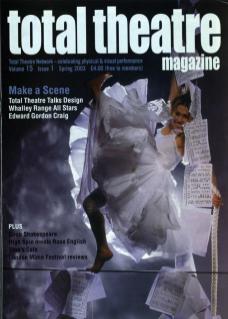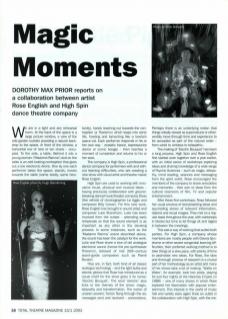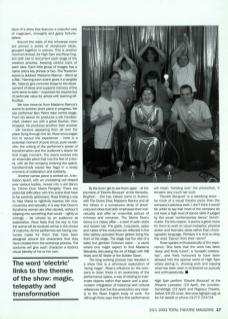We are in a light and airy rehearsal room. At the back of the space is a large picture window, a view of the wild garden outside providing a natural backdrop to the space. In front of the window, a horizontal row of nine or ten chairs – occupied. To the side, a table. Behind it sits a young woman ('Madame Rainna') and on the table is an odd-looking contraption that gives out a low electronic drone. One by one each performer takes the space: stands, moves towards the table (some boldly, some hesitantly), hands reaching out towards the contraption (a Theremin) which leaps into sonic life, howling and lamenting like a lovelorn space cat. Each performer responds in his or her own way – ecstatic trance, expressionist dance or comic boogie – then reaches a moment of completion and returns to his or her seat.
The company is High Spin, a professional dance company for performers with and without learning difficulties, who are creating a new show with visual artist and theatre-maker Rose English. High Spin are used to working with innovative visual, physical and musical ideas – having previously collaborated with groundbreaking dance/music/theatre company Divas (the vehicle of choreographer Liz Aggis and composer Billy Cowie). For this new work, Rose English has brought in sound artist and composer Luke Stoneham. Luke has been involved from the outset – attending early rehearsals so that the sound element is as important as any other in the devising process. In some instances, such as the ‘Madame Rainna' scene described above, the sound has been the catalyst for the work. Luke and Rose share a love of old analogue electronic sound (hence the pre-synthesiser Theremin, beloved of mid 20th-century avant-garde composers such as Pierre Boulez).
They are, in fact, both fond of all classic analogue technology – and the light bulbs and electric globes that Rose has introduced as a visual motif for the show gives it its name: Electric Bouquet. The word 'electric’ also links to the themes of the show: magic, telepathy and transformation. The notion of unseen powers: forces flying through the air, messages sent and received – connections.
Perhaps there is an underlying notion that things initially viewed as supernatural or otherworldly move through time and experience to be accepted as part of the natural order – from wired to wireless to telepathic.
The making of Electric Bouquet has been a long process. High Spin and Rose English first started work together over a year earlier, with an initial series of workshops exploring ideas and sharing knowledge of a wide range of Psychic Sciences – such as magic, telepathy, mind reading, seances and messaging from the spirit world. Rose encouraged the members of the company to share anecdotes and memories – their own or ideas from the cultural reservoirs of film, TV and popular entertainment.
After these first workshops, Rose followed her usual process of storyboarding ideas and squirrelling stores of relevant information, objects and visual images. They met on a regular basis throughout the year, with workshops in blocks but time to let things sit and digest in between the meetings.
This was a way of working that suited both parties. For High Spin, a company whose members are mostly people with Downs Syndrome or other severe congenital learning difficulties, their preferred working method is to take things at a slow pace, with plenty of time to assimilate new ideas. For Rose, the slow and thorough process of research is a crucial part of her methodology as an artist and many of her shows take a lot of making. Walks on Water, for example, took two years, playing for just four nights at the Hackney Empire (in 1986) – one of many shows in which Rose explored her fascination with popular entertainment. This interest in the world of music hall and variety stars again finds an outlet in the collaboration with High Spin, with the creation of a show that features a colourful cast of magicians, showgirls and gypsy fortune-tellers.
Around the walls of the rehearsal room are pinned a series of storyboard ideas, grouped together in scenes. This is another common thread, for High Spin and Rose English both like to document each stage of the creation process, keeping careful track of each idea. Each little group of images has a name and a key phrase or two. The Theremin scene is dubbed 'Madame Rainna - Blind as a Bat'. Naming each scene gives it a tangible life, helps to give concrete shape to the development of ideas and supports memory of the work done to date – important for anyone but of particular value for artists with learning difficulties.
We now move on from Madame Rainna's scene to another short piece in progress. We see performer Ben Pierre take centre-stage. From his sleeve he produces a silk handkerchief, shaken out with a great flourish, then dropped. He produces another, then another – silk hankies appearing from all over the place flying through the air. Rose encourages him to savour the experience – here is a potential moment of pure circus, pure vaudeville: the uniting of the performer's power of transformation and the audience's desire for that magic moment. The scene evolves into an ensemble piece that has the feel of a fiesta, with all the company entering the space, handkerchiefs waved like flags in a lovely moment of celebration and solidarity.
Another cameo piece is worked on. A levitation spoof, with an undulating veil draped over various bodies, moves into a veil-dance by 'Divine Diva' Maria Pengelly. There are potential difficulties with this scene that have to be carefully addressed, Rose finding a way to help Maria to rightfully express her vivaciousness and sexuality in a way that Down's Syndrome women are often denied, without it slipping into something that would – rightly or wrongly – be viewed by an audience as exploitative. Rose feels that the key to how the scene will be received will be in the choice of costume. All the performers are having costumes made for them that have been designed around the characters that they have created from the workshop process. The costume will give each character a distinct visual identity of his or her own.
By the time I get to see them again – at the premiere of Electric Bouquet at the Komedia, Brighton – this has indeed come to fruition, with The Divine Diva, Madame Rainna and all the others in a sumptuous array of jewel coloured robes that both emphasise their individuality and offer an ensemble picture of richness and romance. The Divine Diva's dance is a classy affair – a swirl of satin skirts and tossed hair. The golds, turquoises, jades and rubies of the costumes are reflected in the little battery-operated flower globes lining the front of the stage. The stage has the vibe of a batty but genteel Victorian salon – a world where one might expect to find Madame Blavatsky discussing the art of Magic with WB Yeats and AE Waite of the Golden Dawn.
The long working process has resulted in a show that is a whimsical exploration of 'being magic'. Rose's influence on the company is clear: there is an awareness of the performance space, a way of relating to inanimate objects within that space and a postmodern integration of historical and cultural references that link this production very clearly to the Rose English body of work. For although Rose says that the first performance will mean 'handing over’ the production, it remains very much her work.
Electric Bouquet is a satisfying show – far more of a visual theatre piece than the company's previous work. I don't think it would be unfair to say that most of the company do not have a high level of dance skills if judged by the usual ‘contemporary dance' benchmarks. For this reason, it seems a great move for them to work on visual metaphor, physical action and thematic ideas rather than choreographic language. Perhaps it is time to drop the word 'Dance’ from their name?
Rose speaks enthusiastically of the experience. She feels that the work has been 'deep and finely tuned', a 'synaptic celebration', and feels honoured to have been allowed into the special world of High Spin where joining in, showing work and copying what has been seen is embraced so joyously and enthusiastically.
High Spin perform Electric Bouquet at the Phoenix Leicester (10 April), the Junction, Cambridge (23 April) and Pegasus Theatre, Oxford (19-20 June). See www.highspin.org.uk for full details.


